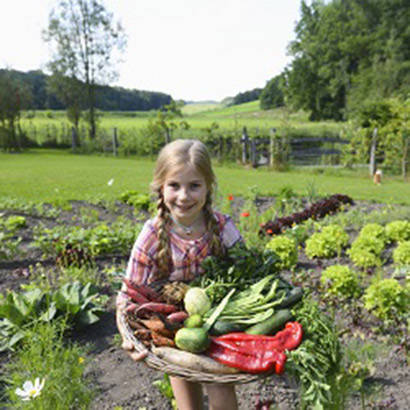
The City of Rockford’s Park District has had a focus on gardening since at least 1999, when the City of Gardens program was initiated. The City of Gardens focuses on urban beautification, reforestation, and gardening. In addition, Ruth Miller, City of Gardens Program Director and Facility Manager for the Nicholas Conservatory and Gardens, explained that the Park District’s Board of Commissioners has identified healthy lifestyles as a programming priority for the district. Establishing a youth community gardening program was a natural outgrowth.
The Park District’s first youth-oriented garden was established about two years ago at Washington Park Community Center (WPCC), which is located in a low-income, predominantly African-American neighborhood. Youth in the summer day camp program work in the garden with two Park District horticulture staff and volunteers. One of the beds is raised to provide accessibility for adults and children with disabilities. The NRPA grant helped to establish a second youth garden, at the Linda K. White Center in the Reuben Aldeen Park, a 103-acre park in the center of Rockford. The park is in a middle-class, ethnically mixed neighborhood. The Linda K. White Center is the location of the Park District’s therapeutic recreation programming for youth with disabilities. In addition to building a new garden, the NRPA grant allowed the Park District to expand the garden at WPCC and add a nutritional component.
Both community centers operate summer day-camps that focus on nature and outdoor activities. Gardening was integrated into camp programming at both sites. At the Linda K. White Center, at least 200 children aged 5 to 10 participate in gardening during the summer, and at WPCC, about 25 fourth- and fifth-grade children. Many of the same children from the summer programs continue to work in the garden after school starts as part of after-school programs at the community center. In addition to vegetables, the children also plant a perennial garden designed to attract butterflies and hummingbirds.
WPCC’s location in an impoverished neighborhood has presented both opportunities and challenges. Clayton Guler, Operations Coordinator/Office Manager for the Nicholas Conservatory and Gardens, stated, “…the majority of these kids are from an area where they don’t have a yard. They don’t have green space. They’ve never been exposed to gardening, to healthy eating.” About a week after this summer’s garden was planted, it was destroyed by vandals. The children were devastated. Fortunately, Mr. Guler had the resources to buy new plants with which to replant the garden. Now, some of the kids check the garden twice a day to make sure nothing else has happened to it.
Now that the initial start-up expenditures have been made the gardens should be sustainable through the City of Gardens budget. However, significant program expansion would require grant funding.
Local partnerships have included cable provider Comcast, which every year, helps prepare the garden beds and clean up WPCC with the neighborhood kids, as part of its Comcast Cares program. This summer, a nutritionist from the University of Illinois Extension Service came to work with kids at both sites. Representatives from one of the local farmers’ markets spoke to the children about growing vegetables. Representatives from Learn Great Foods, an organization that provides farm tours and culinary retreats at farms in the Midwest, came to one of the sites and conducted a program on nutrition. The youth gardening program also partners with some of the public schools and has worked with the Rockford Environmental Science Academy, a public middle school, on its school garden.
The program has faced weather-related challenges as well as acts of vandalism. But as Mr. Guler stated, “Challenges as far as working with the kids, there [are] none. I mean the kids are wonderful. They are excited to be involved with it. It is not an activity where you really have to pull teeth to get them involved and excited.”
For Ruth and Clayton the key to the gardening program’s success is giving the children an opportunity to learn lifelong skills in growing food and the children’s pride and sense of accomplishment.
